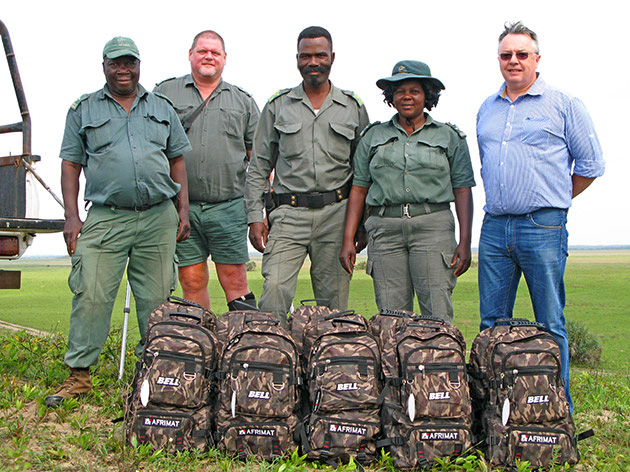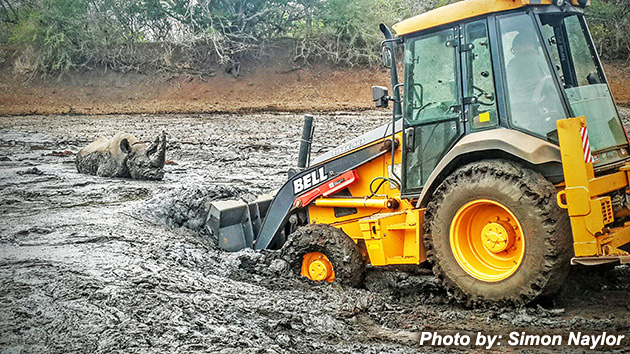South Africa has the largest population of rhinos in the world, making it an incredibly important country for rhino conservation.
And a target for poachers.
Rhino poaching is escalating in South Africa, and one of the worst affected areas is KwaZulu-Natal. More assistance with security and funding is needed around KwaZulu-Natal’s National Parks and Wildlife Conservation facilities, where many of the remaining rhinos are found.
We are at a crisis point, and if the killing isn’t stopped, rhino deaths will overtake births in 2016-2018, leading to extinction. We can’t let that happen!
Last November, our parent company, Bell Equipment, joined with Afrimat KwaZulu-Natal/Free State in the fight against rhino poaching, and they bring mighty powerful equipment to help with the effort.
Taking Action
Unfortunately, rhinos face other dangers besides poaching.
South Africa’s KwaZulu-Natal region is mired in a prolonged drought, devastating to crops and livestock, and leading to water shortages. The shrinking water supply leaves animals desperate for water, causing them to venture into dangerous situations just to survive.
In November 2015, a staff member of At Zululand’s Phinda Private Game Reserve stumbled upon a black rhino mired in mud in the center of what used to be a watering hole. Drying watering holes are scattered across the 58,000-acre reserve, creating hundreds of potential, deadly traps.
When something like this happens, Phinda game managers typically allow for nature to take its course, but because black rhinos are so close to extinction, they make the extra effort to save just one.
“This water hole was favored by this particular black rhino bull,” said Phinda conservation manager Simon Naylor. “I am not entirely sure how he ended up in the middle of this muddy water hole. On this particular day there was a little surface water, and I think he could smell it and tried to get to it and got stuck in the process.”
Naylor and his staff tried to figure out how to get a one-ton animal out of the center of the mud pit. No one wants to get close to a bull rhino, but they needed to get a rope around him or somehow pull him out of the deep mud.
“Our options to get him out were very limited; black rhino are big and potentially dangerous animals,” Naylor said. “We thought of darting him and giving tranquilizers or sedatives but were concerned that he might then lower his head and drown in the mud.”
Naylor decided to bring out the heavy machinery from Bell Equipment and dig the rhino out. “We were fortunate that the base of the water hole was hard and we could advance with the machine and not get stuck ourselves,” he said.
It took over two hours of working very close to an angry rhino, but the team eventually freed him. Naylor said when it was finally out of the mud, the rhino seemed unharmed and walked calmly into the bush.
Every Rhino Counts
“In the last few years, we lost six rhinos to poachers,” Naylor said. “Poaching has left no one unscathed and is unrelenting.”
It’s also on the rise. In total, South Africa lost more than 1,215 rhinos to poaching in 2014—a 21 percent increase over the previous year. They estimate 1,000 more were poached in 2015. Zululand, the location of the Phinda reserve, lost 104 rhinos in 2015, and close to 4,500 total rhinos have been killed in Africa since the surge in poaching began in 2008.
“The poaching is been carried out by well-organized syndicates and multinational organized crime,” Naylor said. “We are fighting this on all levels—on the ground, in the courts, and across borders. We have to be organized and have to show a strong defense through well-equipped and trained field rangers, reward systems, informer networks, and by making use of various technology to combat the threat.”

Mr Mcube (game ranger), Charl Bentley (conservation manager), Jimson Mduyase (game ranger), Dudu Thembe (game ranger), Derek Fraser (Afrimat Marketing Manager KNZ/Free State).
Photo by: Simon Naylor
Sources: Bell Equipment & TakePart.com
Original Articles Published in November 2015


